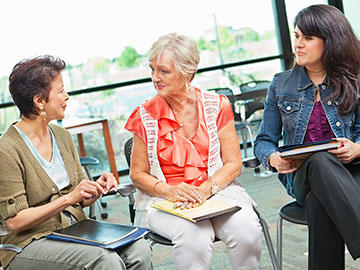

Cancer support groups are meetings for people with cancer and anyone touched by the disease. They can have many benefits. Even though a lot of people receive support from friends and family, people join a support group to be with others who have the same type of cancer or similar cancer experiences. Some research shows that joining a support group improves both quality of life and survival.
Cancer support groups can
Support groups vary in focus. Some groups focus on all kinds of cancer. Others talk about just one kind, such as a group for women with breast cancer or one for men with prostate cancer. Some can be open to everyone or just for people of a certain age, sex, culture, or religion. For instance, some groups are just for teens or young children.
Cancer support groups can also be helpful for children or family members. These groups focus on family concerns such as role changes, relationship changes, financial worries, and how to support the person with cancer. Some groups include both cancer survivors and family members.
In-person support groups often take place at a hospital, community center, school, or other convenient place where people can gather. Depending on the group, some you may need to sign up for, while others you can come whenever you'd like.
Online cancer support groups are "meetings" that take place online. People meet through chat rooms, listservs, webinars, social media (such as Twitter or Facebook), or moderated discussion groups. People often like online support groups because they can take part in them any time of the day or night. They're also good for people who can't travel to meetings or live in rural areas.
Before joining, check the privacy settings and how information is used on the site. Note that some online support groups are sponsored by cancer organizations, while others aren't monitored. Therefore, always check with your doctor about any cancer information you receive from the group to make sure it's correct.
Telephone support groups are when everyone dials in to a phone line that is linked together, like a conference call. They can share and talk to others with similar experiences from all over the country. There is usually little or no charge.
Many hospitals, cancer centers, community groups, and schools offer cancer support groups. Below are some ways to find groups near you.
Before joining a support group, you may want to ask yourself if you're comfortable talking about personal issues with others. You can also think about what you hope to gain by joining one. A support group may not be right for everyone. Some people don't like to hear about others' problems. And some find that their need for a support group changes over time.
If you have a choice of support groups, visit a few and see what they're like. See which ones make sense for you. Although many groups are free, some charge a small fee. Find out if your health insurance pays for support groups.
If you're thinking about joining a cancer support group, here are some questions you may want to ask the group's contact person:
Support groups vary greatly, and if you have one bad experience, it doesn't mean these groups aren't a good option for you. You may also want to find another cancer survivor with whom you can discuss your cancer experience. Many organizations have peer support programs. They can pair you with someone who has your type of cancer and is close to your age and background.
If you would like to reproduce some or all of this content, see Reuse of NCI Information for guidance about copyright and permissions. In the case of permitted digital reproduction, please credit the National Cancer Institute as the source and link to the original NCI product using the original product's title; e.g., “Cancer Support Groups was originally published by the National Cancer Institute.”